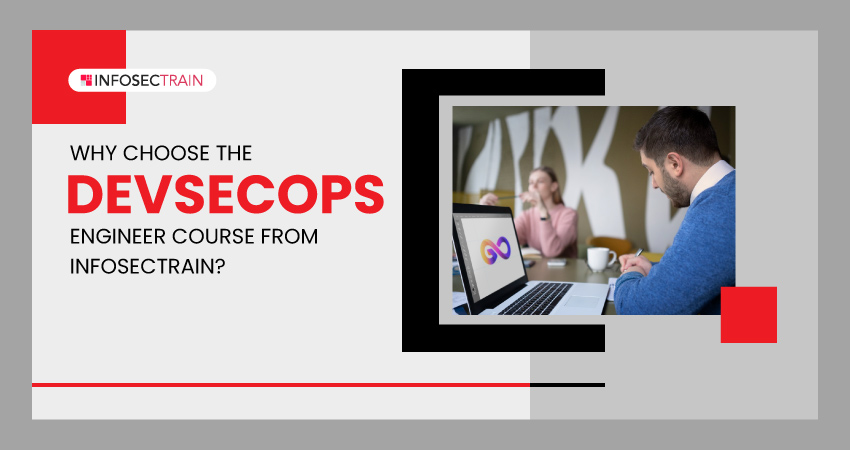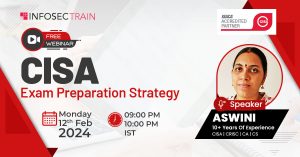Why choose the DevSecOps Engineer course from InfosecTrain?

Table of Contents
What is DevSecOps?
What is the DevSecOps Engineer Course with InfosecTrain?
What will be Covered in the DevSecOps Engineer Course at InfosecTrain?
Career Benefits of Pursuing this Course
Why DevSecOps Engineer Course?
Why DevSecOps Engineer Course with InfosecTrain?
What is DevSecOps?
DevSecOps, short for Development, Security, and Operations, is an approach to software development that integrates security practices into the entire Software Development Life Cycle (SDLC). It extends the principles of DevOps, which emphasizes collaboration and integration between development and IT operations teams, to include security considerations from the very beginning of the development process.
The DevSecOps Engineer’s objective is to make security an essential part of the development process rather than an afterthought or a distinct step. Organizations can establish a more proactive and simplified approach to discovering and addressing security vulnerabilities and compliance concerns by incorporating security practices and technologies into the DevOps workflow.
What is the DevSecOps Engineer Course with InfosecTrain?
The EC-Council Certified DevSecOps Engineer (E|CDE) training course from InfosecTrain is a meticulously crafted instructor-led certification training program. This intensive course empowers professionals with the essential proficiencies to conceive, construct, and uphold secure applications and infrastructure through the adept application of DevSecOps principles. By combining theoretical knowledge with hands-on experience, participants can effectively use DevSecOps practices in various domains, including traditional on-site systems and popular cloud platforms like AWS and Azure.
Upon successfully completing this comprehensive program, participants will become highly skilled at seamlessly combining and automating essential tools, procedures, and approaches. This training program empowers participants to speed up the development of secure software applications that seamlessly synchronize into the flexible structure of a DevOps environment. By fostering a group of capable DevSecOps Engineers, the E|CDE certification enhances an organization’s cybersecurity stance while strengthening the cooperative interaction among development, security, and operations teams.
What will be Covered in the DevSecOps Engineer Course at InfosecTrain?
The DevSecOps Engineer course at InfosecTrain comprehensively covers a range of essential topics. These include:
- Grasp the fundamental principles of DevOps culture, cultivating collaboration and perpetual enhancement within organizational contexts.
- Acquire an introductory insight into DevSecOps, seamlessly integrating security protocols within the DevOps framework to fortify application and infrastructure security.
- Apply stringent security protocols across all DevSecOps pipeline stages, ensuring impervious code, robust testing, secure release, seamless deployment, and sustained vigilance.
- Gain hands-on familiarity with various tools, technologies, and methodologies employed in DevSecOps, spanning planning, code scrutiny, testing, and vigilant oversight.
- Understand the imperative of sustained monitoring and iterative feedback loops, promptly identifying vulnerabilities and preemptively addressing security risks.
- Implement superlative practices for secure operations and vigilant monitoring within the DevSecOps milieu, guaranteeing perpetual security and resilience for both applications and infrastructure.
Career Benefits of Pursuing this Course
Here are some of the career opportunities you can pursue after completing the DevSecOps Engineer course.
- DevSecOps Engineer/Senior DevSecOps Engineer: The DevSecOps Engineer/Senior DevSecOps Engineer is responsible for integrating security into the DevOps lifecycle. They work with developers, operations engineers, and security engineers to ensure that software is secure from the start.
- Cloud DevSecOps Engineer: The Cloud DevSecOps Engineer is responsible for securing cloud-based applications and infrastructure. They work with cloud providers like AWS, Azure, and GCP to implement security controls and best practices.
- DevSecOps System Administrator: DevSecOps System Administrator manages and secures systems used in the DevOps lifecycle. They work with System Administrators to implement security controls and best practices.
- DevSecOps System Engineer: The DevSecOps System Engineer is responsible for designing and implementing secure systems for DevOps. They work with System Engineers to design and implement security controls and best practices.
- DevSecOps Consultant: DevSecOps Consultant is responsible for advising organizations on DevSecOps best practices. They help enterprises to assess their security posture and design a security plan.
- DevSecOps Specialist: The DevSecOps Specialist is responsible for a specific area of DevSecOps, such as secure coding or vulnerability scanning. They work with other DevSecOps Engineers to ensure that all aspects of the DevOps lifecycle are secure.
- DevSecOps CI/CD Engineer: DevSecOps CI/CD Engineer automates the CI/CD pipeline security checks. They work with CI/CD engineers to implement security automation tools and best practices.
Why DevSecOps Engineer Course?
A DevSecOps Engineer course concentrates on incorporating security practices into the Development and Operations (DevOps) methodology. DevSecOps Engineer seeks to foster a culture of collaboration between development, IT operations, and security teams to ensure that security measures are incorporated throughout the entire software development lifecycle. Here are some reasons to consider enrolling in a DevSecOps Engineer course:
- Growing Importance of Security: As the digital landscape evolves, cyber threats and attacks have become more sophisticated and frequent. Organizations recognize the need to prioritize security throughout the development process to protect their applications and data.
- Integrated Approach: DevSecOps promotes the idea that security is not an afterthought but an integral part of the development process. This course will teach you how to seamlessly incorporate security practices into every software development lifecycle phase.
- DevSecOps is a Rapidly Growing Field: The demand for DevSecOps Engineers is high and expected to grow in the coming years. This means that there are many job opportunities available for qualified DevSecOps Engineers.
- Career Opportunities: DevSecOps is a rapidly growing field, and skilled professionals are in high demand. Completing a DevSecOps Engineer course can open up various job opportunities, ranging from security engineer roles to DevSecOps specialists.
- Automation and Efficiency: DevSecOps emphasizes automation and continuous integration/continuous deployment (CI/CD) pipelines. Learning these practices allows you to streamline development processes, reduce manual interventions, and enhance efficiency.
- Risk Mitigation: A DevSecOps approach helps identify security vulnerabilities and weaknesses early in the development cycle. This proactive approach minimizes risks associated with security breaches and reduces the potential impact of attacks.
Why DevSecOps Engineer Course with InfosecTrain?
InfosecTrain is an excellent IT security training and consulting services provider, providing businesses and individuals worldwide with top-quality but affordable tailored training programs. We provide role-specific certification training programs that help professionals prepare for the future. Using DevSecOps principles, our Certified DevSecOps Engineer (E|CDE) certification training course will give a thorough understanding of the fundamental abilities needed to design, implement, and maintain secure applications and infrastructure.
Here’s what you get when you choose InfosecTrain as your learning partner:
- Flexible Schedule: Our training sessions are designed to work around your hectic schedule, allowing you to learn at your own pace and convenience. Whether you’re a working professional or have other commitments, our flexible scheduling maximizes your learning journey.
- Unlimited Post-Training Support: Our commitment to your success has no expiration date. We provide continuous assistance and support until you achieve your certification goals. Whether you have questions weeks or months after the training, we’re here to guide you at every step of the way.
- Comprehensive Learning Resources: Gain access to our Learning Management System (LMS), including recorded sessions. These valuable resources serve as a reference for your post-training review, ensuring that you can revisit and reinforce your knowledge whenever needed.
- Tailored Learning Experience: Our training program is fully customizable to cater to your unique learning needs. We acknowledge that everyone learns differently, so we cooperate with you to establish a customized program that assures you effectively grasp the topics.
- Engage in Knowledge-Sharing Community: Join a dynamic community of learners where you can engage in collaborative group discussions, share insights, and enhance your understanding through peer interactions. Our platform fosters an environment of collective learning and knowledge sharing.
- Recognize Your Accomplishment: Upon completing the course, you’ll receive a prestigious certificate of participation. This certificate serves as a testament to your dedication and signifies your achievement in mastering the essential skills of a DevSecOps Engineer.
- Guidance from Industry Experts: Our commitment doesn’t end with the training. Benefit from expert career guidance and support from seasoned industry professionals. They’ll provide insights, advice, and mentorship to help you navigate your career path effectively.
Invest in your future with InfosecTrain’s flexible, comprehensive, and personalized DevSecOps Engineer training program. We’re here to support you at every stage, ensuring you have the skills and knowledge to excel in the dynamic world of DevSecOps.
TRAINING CALENDAR of Upcoming Batches For Certified DevSecOps Engineer
| Start Date | End Date | Start - End Time | Batch Type | Training Mode | Batch Status | |
|---|---|---|---|---|---|---|
| 16-Mar-2024 | 07-Apr-2024 | 09:00 - 13:00 IST | Weekend | Online | [ Open ] |




 1800-843-7890 (IN)
1800-843-7890 (IN) sales@infosectrain.com
sales@infosectrain.com
 1800-843-7890 (India)
1800-843-7890 (India) 
